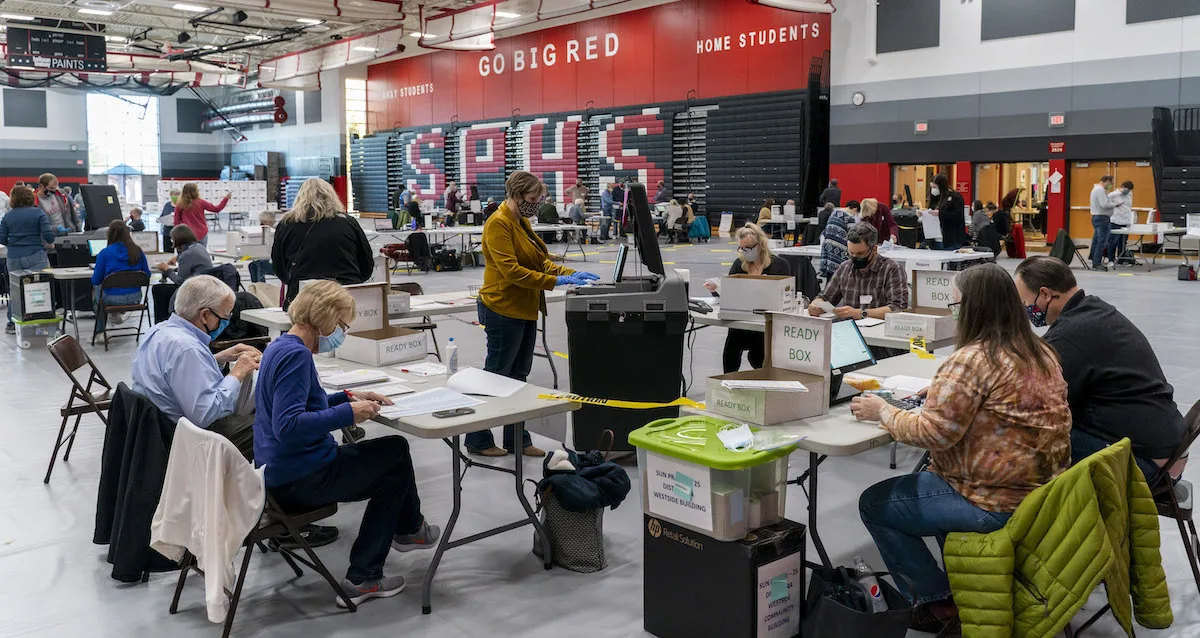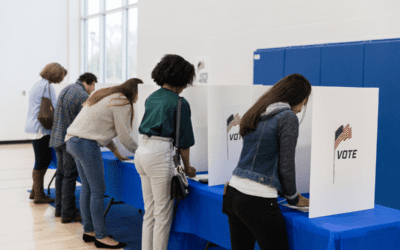
#image_title
Meagan Wolfe tells legislative Republicans the absentee balloting they now dislike is becoming more secure than in-person voting.
Assembly Republicans continue to give credence to specious claims of wrongdoing in Green Bay during the 2020 Presidential Election, though the state’s top election official told them to their faces at a hearing on Wednesday that there is no evidence anything was amiss.
Wisconsin Elections Commission (WEC) Administrator Meagan Wolfe defended the Nov. 3 election procedures and results and absentee ballot security in general before the Assembly Committee on Campaigns and Elections.
Wednesday’s hearing and another one held earlier in March were prompted by an article by M.D. Kittle that was published on Wisconsin Spotlight, a highly partisan blog affiliated with the conservative organization Empower Wisconsin, led by former Republican state Rep. Adam Jarchow of Balsam Lake.
The article is centered on the personnel issues between Green Bay Mayor Eric Genrich and the city’s collaboration with the Center for Tech and Civic Life, which provided grant funds for the Nov. 3 election as well as a consultant from the National Vote at Home Institute to assist the city on Election Day.
The article was based in part on documents released by the City of Green Bay via an open records request. Shortly after the first hearing, the city decided to post all the released documents onto its website so the public could access them and check the facts for themselves.
“Much misinformation remains around the election, with factually inaccurate statements being made which are not supported by the records,” the city’s website reads. “We encourage the community to review the documents themselves rather than relying on the false statements which are being made.”
Committee Chair Janel Brandtjen (R-Menomonee Falls) said Green Bay Mayor Eric Genrich had been asked to come before the committee that day but did not do so. A Green Bay official told UpNorth News that the city had responded to Brandtjen’s request explaining that the mayor was not available on that date and did not receive a response from Brandtjen.
Related: GOP Plan to Restrict Drop Boxes Is Meant to Target Big Cities, but Voters Statewide Would Face Hurdles
One of the biggest questions from the report was what role the consultant, Michael Spitzer-Rubenstein from the National Vote at Home Institute, had on Election Day at the KI Center where the city counted all the ballots cast.
Wolfe said she was contacted by former Brown County Clerk Sandy Juno who raised the question of what Spitzer-Rubenstein was doing at KI Center. Wolfe contacted the Green Bay Deputy Clerk, who was running the election while then-City Clerk Kris Teske was on leave. The Deputy Clerk told Wolfe that Spitzer-Rubenstein was acting as clerk staff that day. Under Wisconsin law municipal clerks can hire city staff or temporary employees to help on Election Day. If he was designated as clerk staff, it would explain why he had access to a phone and laptop during central count.
But regardless of Spitzer-Rubentstein’s role on Election Day, there is still no evidence of election fraud in Green Bay nor in any of the 200 other cities across Wisconsin that received CTCL funds.
During her testimony, Wolfe walked committee members through the several layers of checks an election goes through before it is officially certified, a process where the numbers are checked at the municipal, county and state level. Wolfe said they found no major discrepancies at any level.
Then, she said, voting machines are audited at random to check that they produce an accurate count at the municipal level. Because of the additional scrutiny of the 2020 election, Wolfe said WEC audited more machines than usual. The audit showed, “those results were incredibly accurate.”
“When determining the success of an election I have to look at the data,” Wolfe said. “Relying on those data points at the local level I think we ran a very successful election.”
Wolfe’s assertions were also confirmed by the courts, including Wisconsin’s conservative Supreme Court, which struck down the Trump administration’s lawsuit attempting to throw out 200,000 legally cast votes.
Some of the state lawmakers seemed to demonstrate selective amnesia about the challenges municipal officials faced with administering a presidential election during a pandemic, with record turnout and unprecedented numbers of absentee ballots.
Rep. Ron Tusler (R-Harrison) asked a series of questions on why Green Bay needed additional funds from both the Coronavirus Aid, Relief, and. Economic Security (CARES) Act and CTCL to help administer the election. Wolfe reminded committee members that many Wisconsin municipalities had to ramp up their processes for handling absentee ballots, which was something the Center for Tech and Civic Life and the National Vote at Home Institute could help with.
How the CTCL funds were spent is laid out in a spreadsheet published on Green Bay’s website with other released records.
Wolfe also defended the security of absentee ballots, which in some ways are even safer than voting in-person. Wolfe pointed out that most poll workers check a voter’s registration and have them sign in on paper, which means they do not have access to other precinct’s records. Someone could potentially vote twice at different polling locations because they are not sharing data.
Whenever an absentee ballot is requested, sent out, and returned, it is recorded electronically and can even be tracked through the mail system. If a ballot goes missing or more than one request comes in for the same voter, the system would catch it. Wolfe said that even if there is a discrepancy in the system between the number of ballots requested, sent out, and returned, it is flagged so election officials can investigate.
“It is an incredibly controlled and regulated process,” Wolfe said. “In a lot of ways absentee voting every day gets more and more secure because we’re able to add more checks into the process and automate a lot of those checks to make sure that only registered voters receive a ballot, that we can track it through the mail system, and to make sure that only one ballot per eligible voter be counted.”

Opinion: Many to thank in fair maps victory for Wisconsinites
On February 19, 2024, Governor Tony Evers signed into law new and fair state legislative maps, bringing hope for an end to over a decade of...

Opinion: Empowering educators: A call for negotiation rights in Wisconsin
This week marks “Public Schools Week,” highlighting the dedication of teachers, paras, custodians, secretaries and others who collaborate with...

Op-ed: Trump’s journey from hosting The Apprentice to being the biggest loser
Leading up to the 2016 election, Donald Trump crafted an image of himself as a successful businessman and a winner. But in reality, Trump has a long...

Not just abortion: IVF ruling next phase in the right’s war on reproductive freedom
Nearly two years after the US Supreme Court overturned Roe v. Wade, another court is using that ruling to go after one of the anti-abortion right’s...




